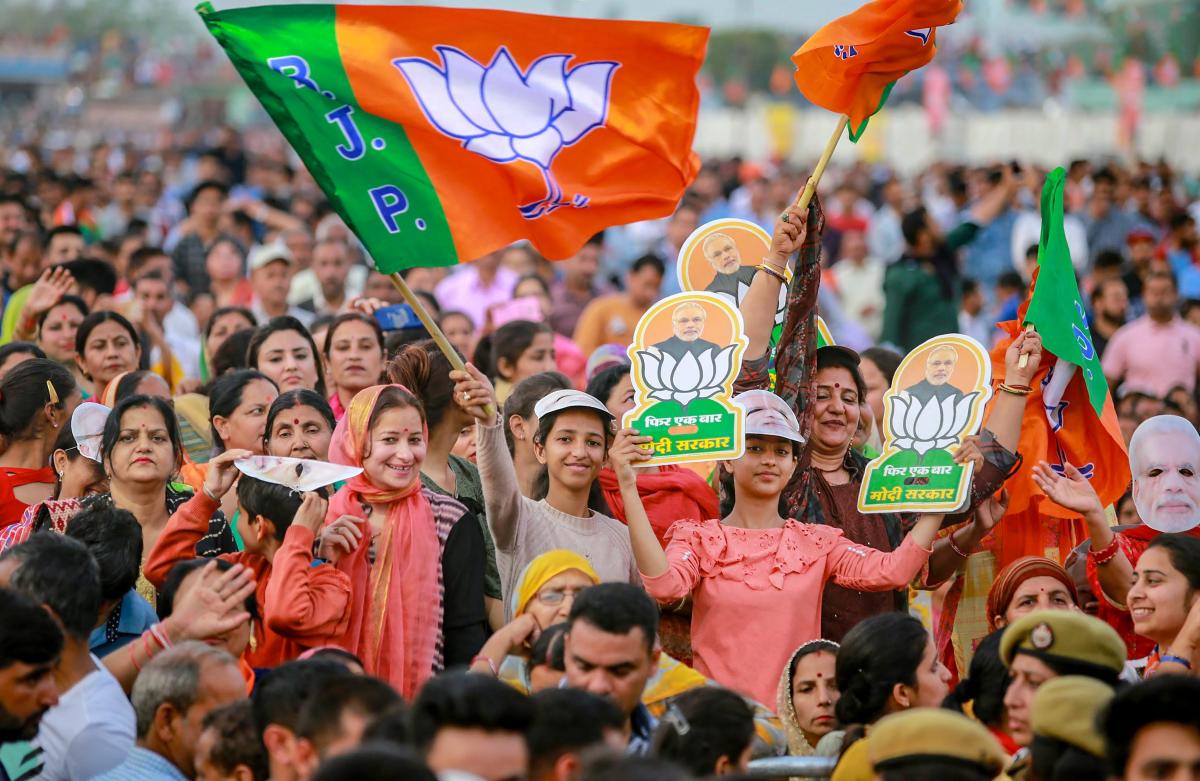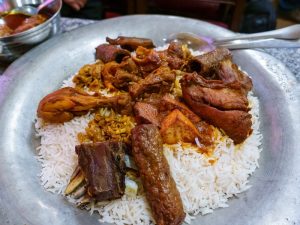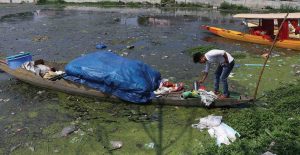
J&K Elections: Stage set for political Dangal, BJP takes first-mover advantage
By: Gyan Verma
The Bharatiya Janata Party is slowly and steadily preparing itself for the upcoming electoral battle in Jammu and Kashmir when the Election Commission announces assembly polls in the union territory created three years ago. The party is trying to gain a first-mover advantage by expanding its existing electoral base. The first political move, in this direction, was made by the BJP during a recent three-day visit of Home Minister Amit Shah to both the regions of Jammu and Kashmir. Speaking at a public meeting in Rajouri on Oct. 5, Shah promised that the union government had decided to provide political reservations to Gujjars, Bakarwals and Pahadi communities as per recommendations of the Justice GD Sharma Commission.
During his visit, Shah addressed public meetings in Rajouri and Baramullah in the Kashmir region. The visit was crucial because the districts of Rajouri, Poonch and Baramullah are close to the Line of Control and members of the three communities are residents of these areas.
Gujjars, Bakarwals and the Pahadi community, according to the estimates of the party, comprise at least 3 million people in both regions and have the ability to influence results in at least 25 assembly constituencies.
“The communities of Gujjars and Bakarwals have suffered a lot because of terrorism. The two communities were brought under reservation as Scheduled Tribes during the tenure of former Prime Minister Chandra Shekhar in 1991. But since then, the decision could not be implemented because of the presence of Article 370,” said Surendra Singh Nagar, a prominent Gujjar leader of the BJP in western Uttar Pradesh who works closely with the community in J&K.
It is now being speculated that the visit of the home minister could be interpreted as a soft launch of the BJP’s electoral campaign in Jammu and Kashmir for the assembly polls, which could possibly happen sometime in 2023.
“It is sad that the people of these communities suffered for so long, but under the leadership of Prime Minister Narendra Modi and Home Minister Amit Shah, justice is being done now,” Nagar said.
Change In J&K’s Political Discourse
In the last four years, the ruling BJP has successfully changed the political landscape of Jammu and Kashmir by taking decisions that have altered the politics of the state forever. Interestingly, there was a gap of one year between each of the three crucial decisions taken by the centre, which led to a change in the political discourse in the union territory.
The first step that triggered a chain of events was taken in June 2018 when the BJP decided to break its alliance with the Peoples Democratic Party and walked out of state government with Mehbooba Mufti as the chief minister and Nirmal Singh of the BJP as her deputy. The breakup of the alliance was a crucial step because, according to the common minimum programme between BJP and PDP, the ruling party had assured its regional alliance partner that there would be no change to Article 370. A year later, the BJP executed the second step on Aug. 5, 2019 when the contentious Article 370 and 35 (A) were abrogated. The abrogation of Article 370 and 35A were the long-standing demand of the BJP and it was also the electoral promise made by the party in several general elections.
Within days of the removal of Article 370, the BJP took the third important step of bifurcating the state and ending the statehood of Jammu and Kashmir. The state was divided into two union territories–Jammu and Kashmir, and Ladakh.
This was the third important decision taken by the centre and it came into effect in Oct. 2019. The bifurcation brought the two union territories directly under the control of the centre and helped the government implement decisions that were earlier difficult.
Providing reservations to the Gujjar and Bakarwal communities in government services and promotions is one of the decisions that has now become possible due to the removal of Article 370. Similarly, reservation benefits were also provided to the Scheduled Caste communities that were earlier difficult to implement because of the preventive nature of Article 370.
“All political parties used Article 370 to deny the benefits of reservation to STs and Scheduled Caste in J&K. It is only after the abrogation that forest rights have been implemented in the union territory for the first time since independence and communities like Gujjars and Bakarwals now get ownership of land. BJP is the only party which has worked for social justice and the empowerment of these communities,” added Nagar.
Delimitation And Assembly Polls
The abrogation of Article 370 and the bifurcation of state led to the beginning of the delimitation process two years ago in 2020. The delimitation process was another crucial step of the BJP that has helped in redrawing the boundaries of both assembly and Lok Sabha constituencies to represent changes in population overtime.
According to the details given by the delimitation commission in May this year, the union territory of Jammu and Kashmir will now have 90 assembly seats with 43 seats in the Jammu region and 47 seats in Kashmir. During the days of statehood, J&K had 83 seats, of which 37 were in the Jammu region and the remaining 46 were in Kashmir.
“Home Minister Amit Shah has made it clear that there would be 10 percent political reservation for Gujjars and Bakarwals in the union territory. It means that, out of the 90 assembly seats, 9 seats will be reserved for the two communities. It is an important decision made by the centre. Even if Pahadi communities are given reservations, this ten percent reservation will remain for Gujjars and Bakarwals. There would be no tampering with our share,” said Ghulam Ali Khatana, the lone Rajya Sabha member from Jammu and Kashmir. Khatana is the first Gujjar parliamentarian from J&K to be nominated by the centre to the upper house.
Even as the BJP prepares for a political and electoral battle with regional parties such as the National Conference and Peoples Democratic Alliance, as well as the Congress, the ruling party hopes that the people of Kashmir will abandon their traditional choice of voting for the NC or the PDP and instead vote for the BJP this time.
Although the BJP has maintained its absolute stronghold over the Jammu region since the 2014 general elections, when all 3 Lok Sabha seats were won by the BJP, the party has so far not been able to win seats in Kashmir region.
The BJP again proved its electoral dominance in Jammu region during the assembly elections in December 2015, when the party won 25 out of 37 seats in the region. During the 2019 general elections, the party yet again repeated its dominance over Jammu region and won all three Lok Sabha seats, but a political breakthrough in Kashmir did not happen.
“The official languages of Jammu and Kashmir are Urdu, Kashmiri, Dogri, English and Hindi. But now the government has identified Gurjari, the language of the Gujjars, as a promotional language,” said Nagar.
History And Political Ambition
The abrogation of Article 370 and 35 (A) leading to the BJP’s political objective of “complete integration” of Jammu and Kashmir with the rest of the country, has been one of the defining demands of both the Bharatiya Jana Sangh and the BJP for over 70 years.
A win in Jammu and Kashmir during elections is an important milestone for the BJP because Syama Prasad Mookerjee, the founder of BJS which later became the BJP, died in Kashmir while demanding complete integration of J&K with the rest of India.
“Jammu and Kashmir has been the centrepiece of BJP politics since the days of BJS. The removal of Article 370 was a long-standing demand of the BJP and if the party is able to form a government on its own, then it will be a big political win for its politics,” said Ellora Puri, political scientist at the University of Jammu.
The mention of Jammu and Kashmir in the BJP’s politics is also interesting because Prime Minister Narendra Modi played an active role in the Ekta Yatra in 1991-92 which was led by the then BJP president Murli Manohar Joshi.
Interestingly, it was under the leadership of the PM when the BJP, for the first time, was in a position to play a role in government formation in J&K. According to the understanding reached between the BJP and PDP, Mufti Mohammad Sayeed became the chief minister after the assembly polls in 2015, and later Mehbooba Mufti became CM after the death of her father.
“The BJP has managed to gain political dominance in areas of the Jammu region where Hindus are in the majority. Now, the party is trying to win votes in areas of Jammu and Kashmir where Muslims are in the majority. It is important for the BJP to expand its voter base to form a government on its own in the union territory or play a decisive role in government formation,” said Puri.
She further said that even as Home Minister Amit Shah has promised reservations for Pahadi communities, the challenge for the BJP will be to define the Pahadi community and which communities will get the benefits of reservations.
The assembly polls in J&K will also be interesting because, apart from the traditional regional parties like NC and PDP, a new entrant is the Democratic Azad Party, which was formed by former Congress leader Ghulam Nabi Azad. The role of Azad’s party can change the outcome of the elections if it manages to divide the anti-BJP votes by bringing down the vote share of Congress and regional parties.

